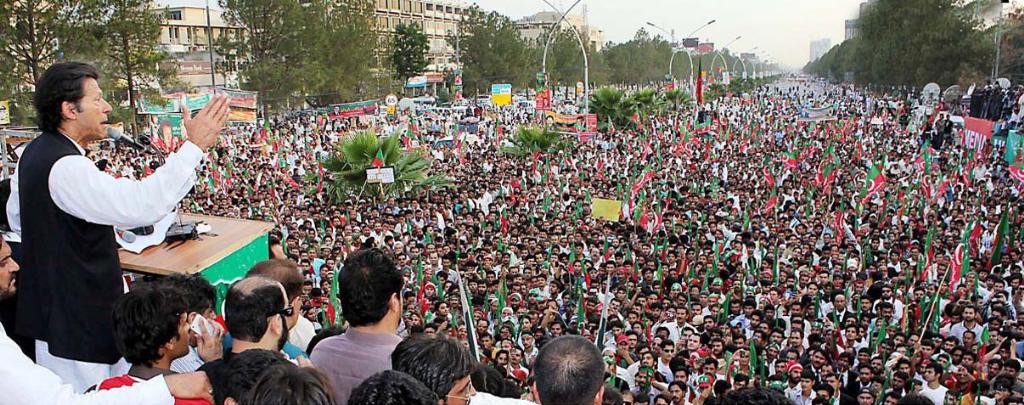KHAN AND QADRI RALLIES REACH ISLAMABAD'S 'RED ZONE', ARMY ON HIGH ALERT
Copy of Imran Khan addressing a PTI rally

NEW DELHI: Imran Khan’s Pakistan Tehreek-i-Insaf (PTI) and Tahirul Qadri’s Pakistan Awami Tehreek (PAT) rallies reached Islamabad’s designated “red zone” on Tuesday, setting up camp outside Parliament House as the Pakistani government, other members of the opposition, and the army appealed to the leaders to end the protests.
The Army assured Prime Minister Nawaz Sharif, according to reports coming in from Islamabad that there will be no military coup but urged the leaders to meet. The Sharif government that is putting up a brave face and insisting that it was business as usual despite the large crowds camping in the Red Zone that houses all the important government offices and residences of the top leaders, has let it be known that the Prime Minister is willing to meet Khan.
Khan remains adamant that his supporters will storm the government bastion unless Sharif steps down. The Army is out in large numbers but reports suggest that it is unlikely to move against the demonstrators if push comes to shove in this growing confrontation between the opposition and the government.
PTI’s “Azadi” March and PAT’s “Inquilab” March, that commenced on Pakistan’s Independence Day 14 August, were called in response to allegations of corruption, including a rigged election, the propelled Nawaz Sharif’s Pakistan Muslim League - Nawaz (PML-N) to power.
Khan’s party came in third in the elections, and has since maintained that the process was rigged. On Monday, Khan announced that the PTI would resign from all seats in the National Assembly and all provincial assemblies, barring Khyber Pakhtunkhwa, which the PTI controls.
Addressing his supporters, Khan gave Pakistani Prime Minister Nawaz Sharif till Wednesday to step down, vowing to storm the PM’s house if he fails to do so. "If Nawaz Sharif does not resign then we will enter into the PM House," said a committed Khan.
Qadri, who has long called for revolution, was based in Canada before he flew back to Pakistan in June -- with the government diverting his flight to Lahore to prevent him from landing in Islamabad. Qadri has presented a list of 15 demands, which calls for the resignation of the provincial and and federal assemblies and for the Sharif brothers to be arrested. Qadri, too, gave the government 48 hours to implement his demands.
With Sharif raising cries of a conspiracy to bring the elected government down, PTI and PAT found a common ground. The two parties agreed to a four point agenda which is:
- The struggle will be democratic and will bring in true participatory democracy
- The struggle will be constitutional
- The movement will be non-violent
- Both parties will condemn any unconstitutional measure and neither will accept martial law.
The two have found common ground, for now, but differ in their key demand. Both want the Sharif government to resign, however, Khan wants fresh elections and a new democratically elected government whereas Qadri wants a national government composed of technocrats.
Although the government has not stopped the marches into Islamabad, the army has been deployed in sensitive areas. The army was moved in on the pretext of preventing a backlash from the military operation in North Waziristan, the stronghold of the Tehreek-i-Taliban Pakistan (TTP), however, the timing would suggest that the decision was tied to the announcement of the Independence Day marches.
Although the anti-government marches have no real legitimacy, given that Sharif’s party has a majority in the National Assembly and will not willingly vote itself out of power, the threat posed by these movements has definitely alarmed the ruling party, which would explain the ban on gatherings, the impounding of vehicles, the closing of petrol stations and the deployment of troops to Islamabad. Ironically however, Sharif’s decision to deploy the army has given his critics more fodder, seemingly indicating that Pakistan’s civilian administration is still heavily reliant on the country’s military, which has ruled Pakistan through a series of coups, for protection.



